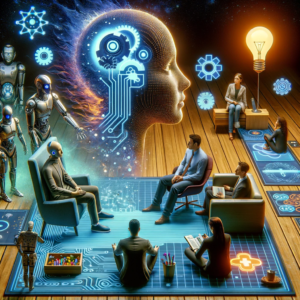Continuous Education and AI in Counseling
The need for continuous education and perspective is crucial for all humans, especially aspiring counselors. As society increasingly encounters the societal implications and impact of Artificial Intelligence (AI), exploring the various therapeutic multicultural counseling approaches influenced or expanded by AI becomes essential. The convergence of AI and therapy represents not just a technological evolution but a philosophical shift, challenging our traditional notions of empathy, understanding, and human connection within therapeutic settings.
AI’s Potential in Career Counseling
Particularly relevant is the exploration of career counseling for underrepresented populations in the face of AI advancements. Many people, especially low-income minorities, may face job loss and significant shifts in lifestyles and career trajectories due to AI and corporate practices. As repetitive tasks are replaced by AI, there’s a pressing need for re-training and education on collaborating with AI, including for future counselors. Counseling will be crucial for those grappling with a loss of purpose or seeking to identify niche specialties and passions.
The Fast-Changing World and AI’s Role
If counselors are not proactive about these shifts in AI, companies developing AI-driven therapy, like “Clive AI,” may dominate the space. While AI offers immense potential, it’s imperative that counselors remain grounded in preserving the authentic nuances of the human experience. This is why becoming more involved with AI is so important.
AI in Mental Health Therapy: Promise and Challenges
An article from NPR discusses the promise and challenges of using AI for mental health therapy. It highlights how AI, such as chatbots, can support people dealing with isolation, mild depression, or anxiety. However, there is still debate and skepticism about the capacity of machines to read or respond accurately to the full spectrum of human emotion. The potential pitfalls of AI in therapy, especially when it fails to emulate empathetic care, are a significant concern.
Conclusion
The integration of AI in counseling and therapy is a complex yet inevitable progression. As AI continues to evolve, its role in mental health care, particularly in career counseling and addressing the needs of underrepresented populations, becomes increasingly significant. Counselors must stay informed and adapt to these changes, ensuring that AI is used as a tool to enhance, not replace, the human elements of empathy and understanding in therapy.
Source: NPR – Therapy by Chatbot? The Promise and Challenges in Using AI for Mental Health
This NPR article discusses the promise and challenges of using AI for mental health therapy, providing insights into how AI can support people with mental health issues and the ongoing debate about the capacity of machines to emulate empathetic care.






